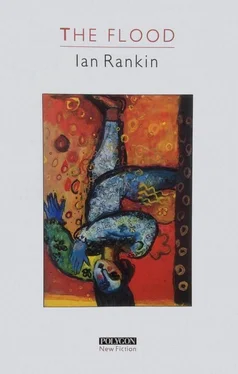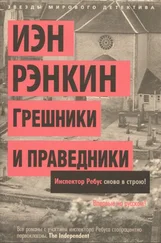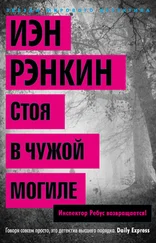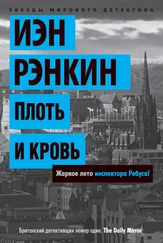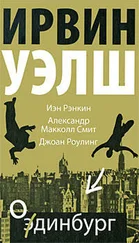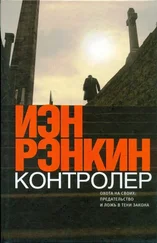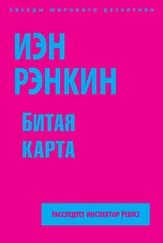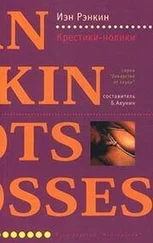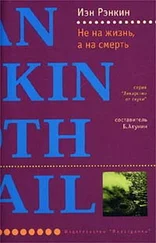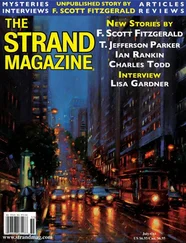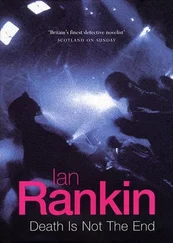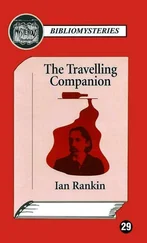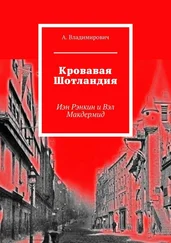He considered the possibility of someone outside throwing a rock at his window. What would he do? He would not duck, just as he had not attempted to dodge Rian’s slap. He would sit and watch the rock’s trajectory cutting towards his reflection. His eyes would close over the splinters of glass. Why would he sit there? To experience, and so that afterwards he could curse his maker for creating the incident. He believed in God now, but it was a malevolent thing and he would speak of it with a small, vehement “g”. He believed in god. He believed in the cruelty and the inevitability of suffering. And he believed that he was doomed. As if to reassure him, thunderclouds gathered above the Firth of Forth. The train passed over and through the red structure of the bridge in a mist that hid from view the road bridge and the water. He knew that it was all because of him.
Soon enough, Edinburgh presented itself to him as a grey smothering of tall buildings. He walked up the steep incline from Waverley Station and was confronted by roadworks and fumes and a slow drizzle. He made towards Princes Street, one hand in his pocket so as not to lose his tiny roll of money. The city’s coldness was a physical thing. People brushed past him without noticing. No one nodded or acknowledged his existence. Soon he was soaked. The drizzle was fine, but the traffic blew it into his face as though he deserved no better.
In a café, he was overcharged for a can of lemonade. He clutched his pound notes more carefully. The large shops were like nests of vivid ants. The streets were strewn with litter and curious men who asked for money or slouched on benches. Tourists walked by slowly, seeming not to see any of it except what they were there to see. Sandy began to wonder if it were real at all. He bought two records cheaply in a shop in South Clerk Street. Everywhere shops were being closed down, redecorated, and opened again. Many of the windows were boarded up. FOR SALE signs cluttered the immediate skyline. He found himself in a small concrete square. People sat on the steps around this square and talked. They seemed quite young, though a few years older than him. It was quiet all around. The road curved away from the square at a decent distance. The buildings were a mixture of the very old and grey and the very new and white. He ventured into one of the newish ones. It had a glass dome, beneath which sat a clump of tropical plants and trees. Music played in a café. There was a bank. Two other sorts of shop were closed. By reading various notices dotted around, Sandy was able to conclude that he was in a part of Edinburgh University. He was startled. He looked around furtively, but no one seemed about to throw him out. He walked out of the building and crossed the square to another, older construction. Inside, it offered much the same facilities as the first. They were like small, self-sufficient communities. For some reason they reminded him of Cars- den. He wished that he had brought Rian with him. He wondered why he had not thought to ask her. He had not seen much of her in the past weeks. His mother had scared him off, but he had not given her up. He had not had enough money to bring her with him; that was all. He needed more money. Robbie, he felt, would never agree to let her go for less than thirty pounds. Sandy had only twenty-seven pounds fifty, less what he would spend today. He squeezed his pocket, wishing the money would grow.
He sat in the building for a long time. He ate a sandwich in the empty cafeteria. It was peaceful in there. He did not want to leave but the train home was in less than an hour. In a good bookshop near the University he bought a book of poems by Ted Hughes, whom he had studied at school, and a novel which he had heard about somewhere. Then he walked down to the station, getting lost twice and having to ask directions twice. Once, he could not find anyone who knew anything about Edinburgh and he ended up asking a news-vendor, from whom he felt obliged to buy an evening paper, though it cost him another sixteen pence.
The train was crowded with people going home from work. He had to stand in a smoking compartment, and began to feel sweaty and sick from the fumes. The people seemed used to it all. They read their evening papers or their books and never talked or looked at their neighbours. Sandy, clutching his books and his records, could not read. Instead he watched from a small piece of available window as the thunderclouds over Fife churned and churned their way towards the interior.
George Patterson watched the empty, wind-lashed streets through the grimy window of the Soda Fountain. He had counted the day’s taking, a pathetic sum. He had been thinking of the approaching winter. He could not face another one. He was thinking now of Carsden, of the town it had once been, of the man he had once thought himself. He was in ruin, like the town. He had lived a life that had been nothing less than a direct damnation for over sixteen years. He had sinned grievously. He had lied, had cheated, had watched his foulness push its way into the hearts of others in the deceptive guise of smiling acknowledgement, and he had detested every minute of it — wondering when his lies would be revealed, hoping and praying that they would, but never having his wishes granted. Wondering when he would crack, when he would reach the final edge of the final pit, stare deeply into it, and resolve the crisis. That stage had been reached. He had spent this last day ticking off the tumours in his life, an act of worthless self-excoriation that he had performed before, but never with the same resolve. Takings could be no lower. The summer was over. His life could be measured out by the half-empty jars of sticky, indeterminate things on his shelves. He was full of self-pity, and the only way to end his hypocrisy was the easy way, and the most difficult.
He went through to the alcove and swept up the trimmings of hair from the day’s two appointments. He tipped the lot into a bin and stood the brush against the wall. Then he went into the tiny back room, where a bottle of whisky was wrapped in thin brown paper on the desk. In a drawer of the desk sat three small bottles of assorted tablets. These tablets had challenged him before. Now he felt equal to their challenge. He wagered the whisky against their success. He sat at the table, took a sheet from the drawer, and began to write in a childish, antiquated script.
It had rained all day and all of the night before. The river had burst its banks and flooded the park to a depth of nearly twelve inches. Part of the main road to Lochgelly was also flooded, though not quite impassable. Water gathered at roadside drains and waited patiently to be consumed. People were saying that they had never seen rain like it. It had fallen like a judgement in sheets of thick silver and black. Now it lay in the gutters and in pools, and people inspected it as if seeking the force that had been evident in its falling. But it was broken now, seeping back into the land as though its purpose had been fulfilled.
Broomsticks might be hanging in the sky. You could not say for sure that they were not. It was certainly dark enough up there for them.
But it was not Hallowe’en.
There were no whooping children, no turnip lanterns reeking, no outlandish costumes. Yet Sandy, walking silently through the drying streets, was thinking Hallowe’en thoughts. Chap, chap, chap, we are the guisers. That was the song for Hallowe’en, the witching time. But this was only the end of September. Hallowe’en was a long way off. He walked nervously past houses where he was known. He listened to the blaring televisions and arguments in every house, the arguments reminding him of those he had been having with his mother. Yet he had signed the options for Highers. He had not told her that, but he was sure that Andy Wallace would have. Homework begged to be done now, but his mind was full of Rian.
Читать дальше
